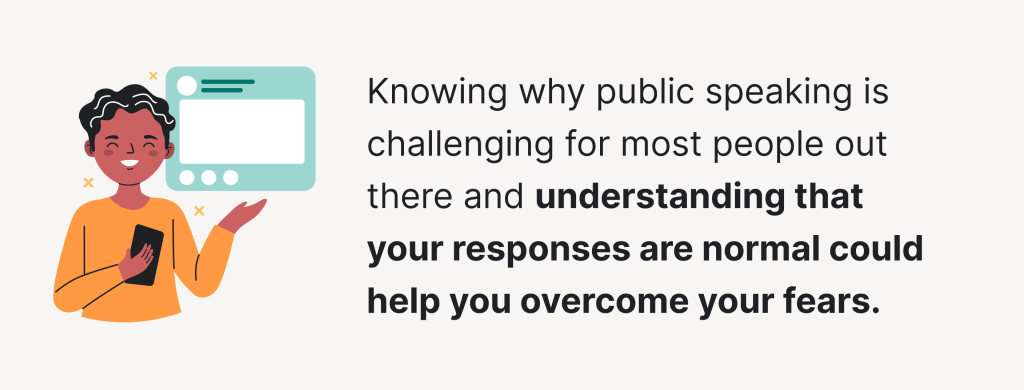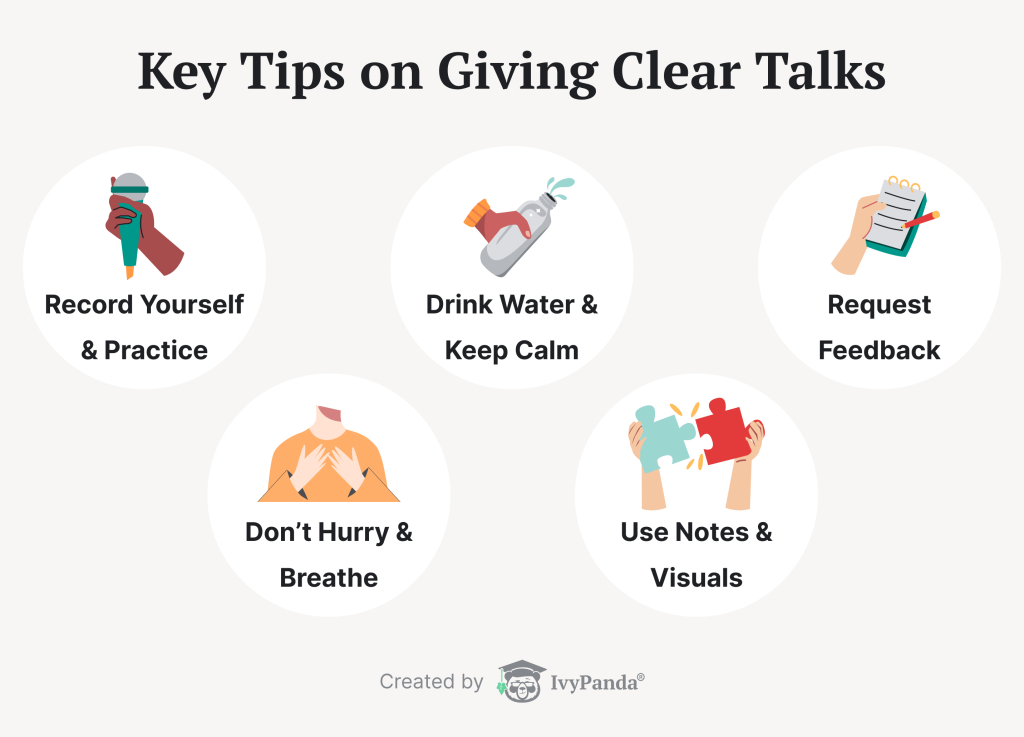Many students find it challenging to deliver reports, presentations, and speeches. Often people feel they do not have the skills or guts to present their ideas in front of a crowd. This is especially the case when speaking before a group of strangers.
Delivering public speeches is often necessary to move forward in your career and studies. It is one of the ways to impress anyone, from classmates and professors to colleagues and bosses. Public speaking is an important skill to master.
To let you sharpen your public presentation skills, our experts have collected valuable tips to help you shine. On this page, you will learn more about the challenges of public speaking, how to address them, and key recommendations for improvement. We have also compiled sample topics to inspire and help you on your public speaking journey.
️ 🎙️ Why Is Public Speaking so Challenging?
Public speaking is difficult for many clever and gifted people out there. If you are one of them, don’t worry because this challenge is normal and surmountable. You can find numerous free college essays in our database discussing this very issue.
Indeed, few people can confidently perform before large audiences, especially strangers. In fact, research shows that about 77% of the population has a fear of public speaking.

What causes these jitters?
- Our fight or flight response. People will confront and fight what they think they can conquer and avoid what they believe will overpower them. Big crowds are scary and unpleasant, especially when you’re forced to perform.
- Fear of judgment. Many dread the court of public opinion. People often think they aren’t “good enough,” focusing on how correct their views are and whether they excite their listeners.
- Negative self-image. Low self-esteem and insecurities hamper effective public speaking. Those who lack faith in their capabilities or sense of self-worth have difficulty with public speaking.
- A lack of experience. Inexperienced public speakers often have limited confidence. They are unsure they can manage their audiences’ expectations and dread performing in front of a crowd.
- Fear of evaluation. Both imagined and actual assessments can build anxiety. This can result in speakers losing focus and confidence.
- Unfamiliar audience. Generally, people feel more relaxed when talking to or performing in front of familiar faces. In particular, inexperienced speakers can feel stressed when delivering a speech to a new audience.
- A lack of preparation. An ill-prepared public speaker lacks confidence in their presentations. They are likely to worry about making mistakes or facing rejection from their listeners.
🍸 Types of Public Speaking
Throughout your study years, you will have to present in public regularly. At the very least, you will make reports and deliver effective PowerPoint presentations to your classmates.
There are also other situations in which speeches may be required. For them, you should be familiar with the following types of public speaking.
Ceremonial
Ceremonial public speaking is when you deliver a speech on special occasions. For instance, you may give the toast on graduation day or at a company’s anniversary. This type of speech is more successful when you develop a personal or emotional connection with your listeners.

A successful ceremonial speech includes the following vital components:
Demonstrative
A demonstrative speech allows the speaker to share a skill or knowledge with listeners. This type of public presentation is common in lecture halls, business environments, and training events. As a speaker, you will generally cover the following:
- What does the given process involve?
- How does something work?
- How can an audience member do, make, or fix something?
Below are the vital elements that comprise an effective demonstrative speech.
Informative
An informative speech focuses on successfully transferring crucial data to a group of listeners. Its goal is to communicate knowledge without persuading anyone. Lectures, presentations at conferences, team announcements, or simple class reports tend to be informative rather than demonstrative.
You can bolster your informative speech for increased impact with these elements:
Persuasive
A persuasive speech aims to convince your audience to buy into your position or viewpoint. It’s a marketing tool that lets listeners see things from the presenter’s perspective. These speeches tend to have a strong emotional appeal and expressive language.

To deliver an impactful, persuasive speech, you should work on these skills:
🗣️ Skills for Public Speaking
Unfortunately, most students falsely treat successful speech delivery as one technique instead of a combination of many talents. In reality, public speaking is a science and art that requires a full toolbox of skills. Developing them helps you seize the chances that come your way and maximize them without wasting too much time on training.

Below, we will discuss various public speaking skills you need and clarify how to perfect them.
Articulation
The key to public speaking hides in plain sight: you should be able to communicate your viewpoints to an audience. It’s the crux of the process. Therefore, all the other skills won’t benefit you much if you fail to articulate your ideas.
To get better at communicating information, you have to master different articulation elements:
- You should be able to enunciate the words clearly. No stuttering or mumbling is allowed.
- You should learn how to speak loudly enough for every listener to hear. Yet, you can’t scream at your audience.
- Make sure you can speak adequately without an abundance of filler words or verbal crutches like “um.”
- Lastly, you should remember your speech without a script. Otherwise, you might unnecessarily repeat yourself, pause too often as you try to remember words, and stumble on words.
Memorizing your speech to the dot isn’t a must. It lowers your authenticity and hampers with natural delivery. Yet, only skilled speakers can perform well without written scripts. For inexperienced individuals, remembering the script is essential.
Reasons to remember your speech:
How Do You Improve This Skill?
- Be loud but don’t yell. At times, feeling nervous may prompt you to talk more softly. However, it might produce negative feedback that makes you sound and feel less confident. Practice different volume levels and see what is the most suitable for you.
- Practice tongue twisters. If you want to connect to your listeners, you should have good diction. Learning and repeating various tongue twisters is just one of many ways to improve it.
- Check your grammar. When developing your speech, be sure to proofread and edit the structure. Spelling mistakes won’t be noticed, but poor grammar will affect your performance and speech quality.
- Add clarity. Rework the fragment if you think something sounds ambiguous or tricky to understand. You should be confident in the clarity of your material.
- Speak lower. Studies reveal that speakers who speak louder and lower appear more authoritative and dominant. Women who speak in high, soft tones are excellent examples.
- Drink water. Your hydration level directly affects your voice. Your voice sounds better as soon as you take a sip of water.

Timing & Pacing
The speed of your delivery directly affects your presentations. It refers to your pacing and how long it takes to get to the point and finish your speech.
How Do You Improve This Skill?
- Talk at a moderate speed. Don’t speak too slowly, or else you might sound boring. Inversely, speaking too fast might make you sound annoying and challenging to understand.
- Record and listen to your voice. Improve your pacing by recording yourself reading books or your speech. Replay these to check your delivery quality, speed, and pronunciation.
- Make pauses. Silent moments help you transition between thoughts and give your listeners time to prepare for your following points. Thus, learn how to use pauses in your speech.
- Consider your audience. You can’t get lost in your thoughts when performing. Pay attention to the listeners and mind what they need and can handle at any time. Notice their reactions right away and act accordingly.

Body Language
To give an impression of a confident and capable speaker, use body language to your advantage. With its help, you can make your listeners perceive you as a relaxed and experienced orator, regardless of the circumstances.
Body language refers to all the nonverbal signals an individual can send during direct communication. It includes:
- facial expressions;
- gestures;
- stance and posture;
- mannerisms;
- eye contact and overall gaze;
- and other small conscious (or unconscious) movements you make when talking.
As a speaker, you can use your body language as an efficient tool to engage your audience. Yet, is this necessary?
According to different studies, 65% to 90% of direct communication is nonverbal. Even your unspoken cues give some of the loudest insights about you. Remember that your audience isn’t just listening to you; people are also looking at you.
Proper gestures and facial expressions help listeners match their energy as they pay attention to your speech. Besides, appropriate movements can let you emphasize your points and make them sink deeper into your listeners’ minds.
How Do You Improve This Skill?
- Maintain eye contact. Don’t avert your eyes from your listeners for longer than a few seconds. Try to look at different sections of your audience during the speech. In addition, eye contact stops you from burying your head in the notes.
- Mind your posture. Always stand upright to inspire confidence. This way, you create a posture of control. If you speak while seated, sit upright.
- Hand gestures. Don’t be afraid to move your hands while talking. With appropriate gestures, you can highlight your points and keep your audience’s attention. However, don’t wave your hands around for every sentence.
- Smile on target. You should try to look cheerful, not to intimidate your audience (unless it’s your goal). So, smile more! It makes you appear reliable, sincere, and relaxed. However, moderate it to avoid sending wrong impressions.
- Don’t purse your lips. It’s one of the apparent signs of distress you can send to your listeners. By avoiding this movement, you will seem confident even when struggling.

Research
Research takes you on an exploratory journey, a necessary step when writing your speech. It allows you to get hold of the material, fill in the gaps in your knowledge, and get interested in the topic. It also saves you from obvious mistakes and surprises during the FAQ section.
You can check a step-by-step guide on researching or take a look at these tips:
How Do You Improve This Skill?
- Select a manageable topic to research. Choose an idea that isn’t too wide or narrow. This way, your research will fit your interests and speech assignment requirements.
- Mind your interest. Always choose a topic that will engage or excite you. Otherwise, you will have challenges researching a boring subject.
- Consider your listeners. Your curiosity is crucial, yet don’t include information that will be intriguing for you only. Keep in mind your audience’s interests when researching your speech.
- Mind your knowledge level. Consider how much you know or can understand a topic or subject before researching it. Otherwise, your speech won’t be informative and precise enough for your audience. You may also lack presentation materials and struggle to answer your listeners’ questions adequately.

Authenticity
Authenticity is about making your listeners see what you see and feel what you feel. Mainly, this skill emerges naturally among experienced speakers. For instance, if you deliver a speech on a topic that you are passionate about, your body engages, your eyes brighten, and your voice powers your breath.
Being authentic demonstrates your ability to present yourself to your audience. It lets your listeners interact with the real you without seeing a clone or another zealous keynote speaker wannabe.
People naturally appreciate listening to genuine speakers. When you succeed in acting as yourself, they will actively pay attention to your speech.
Therefore, stop pretending:
- If you’re nervous, don’t overcompensate by acting up since you may look too assertive.
- When you recall your speech, don’t repeat it word for word. Instead, change the wording if appropriate to sound genuine.
- In case you aren’t comfortable joking, don’t add humor to your speech. You may feel obliged to humor your audience to win it over. Yet, if you’re not delivering your standup routine, you don’t have to make jokes.
Learning to be yourself puts you in an advantageous position to deliver value to your audiences.
How Do You Improve This Skill?
- Know your values. Improve your authenticity to gain distinction by developing your sense-worth. Know who you are and what you stand for, and don’t be afraid to show it.
- Get clear on your intentions. Hone your authenticity by clarifying your presentation’s objectives. Explain what you want to deposit in your listeners’ heads and hearts after they leave.
- Speak with emotion. Consider what your target audience is all about and try to appeal to its feelings when appropriate. Predict how you can handle your emotions and theirs.
- Be willing to connect with your audience. Don’t get obsessed with yourself, your speech, and your actions. Seek to be approachable toward your listeners. This way, you can earn their respect without demanding or expecting it.

🚩 Common Problems and Solutions
Challenges may come despite thorough preparation and training. When they arrive, they shouldn’t indict your competence or cause public speaking anxiety. Always remain calm, take some deep breaths, and follow these tips to fix the most common problems.
🎉 Time-Tested Tips for Delivering a Speech
So far, you’re abreast of everything you need to deliver a keynote speech. To guarantee your success, use the following actionable tips to sharpen your presentation skills.

- Record yourself practicing. It allows you to review your speech for improvement. Check whether your grammar and inflections are correct when you speak and whether you’re clear. This can also help you get ready to handle a live crowd.
- Admit your fears. Feeling jitters is normal. Therefore, don’t be afraid of admitting it, as it helps you and your audience feel at ease with each other.
- Breathe steadily. Whether you’re using yoga techniques, this practice calms your body. You can try breathing exercises to inhale and exhale deeply when nervous. It will let you speak without feeling frenzied.
- Have some water close by. Take a sip or a few during your speech. Water will soothe your vocal cords and nerves, improving your articulation.
- Use notes. They can allow you to stay on the topic even when something goes unplanned. If you’re interrupted, face technical difficulties, or attempt to speak impromptu, notes will return you to your point. Yet, don’t read them verbatim.
- Use visuals. Graphic materials enable your listeners to understand your message better. They also divert some of their focus from you if a sea of eyes makes you nervous.
- Be aware of your body language. If you’re not yet ready to use your body language to communicate, pay attention to your posture first. Then, add hand a few hand gestures that will underline your central ideas. Finally, train yourself to look at your audience.
- Accept that you can’t know everything. Whatever you do, you remain human. If you don’t know something, admit it directly.
- Do not hurry. Don’t rush your audience through anything. Take enough time to present your ideas and allow your listeners to take them in. Besides, give them time to react when necessary.
- Request feedback. Ask for comments and questions about your topic. Also, make sure to get feedback on your performance. Listening to criticisms can let you improve your future speeches and give your listeners more value.
📜 Practice Topics for Public Speaking
Finally, we’ve compiled 12 awesome topics to sharpen your public speaking skills. Use them to prepare speeches for practice and perform before your friends and family. Or record your performance to review later. If you can’t find an appropriate topic here, you can check other original ideas on our website.
Try out these public speaking topics:
- AI vs. the human mind.
- Stop nanotechnology research.
- Super greenhouse effects on the environment.
- Stop hunting whales for food.
- Leadership styles and personalities.
- Reasons to become a freelancer.
- Make the Internet accessible for all.
- Helping toxic employees.
- Governments should ban animal testing.
- Governments must criminalize age discrimination.
- Consequences of over-dependence on technology.
- Criminalize bullying in schools.
We appreciate your visit to this page! All the best of luck with your public speaking journey. You can share this post with your friends who seek to excel in speech delivery.
🔗 References
- Why Are We Scared of Public Speaking? – Theo Tsaousides, Psychology Today
- Types of Speeches – Layne Goodman and Amber Green, Maricopa Community Colleges
- Tips for Effective Delivery – Hamilton College
- Important Public Speaking Skills for Workplace Success – Alison Doyle, The Balance
- 10 Tips for Improving Your Public Speaking Skills – Marjorie North, Professional Development, Harvard DCE
- Student Success Series: Tips for Improving Your Public Speaking Skills – SNU Professional and Graduate Studies
- 10 Public Speaking Tips: How to Relax, Focus, and Shine at Your Next Presentation – Purdue University, Global
- 9 Tips to Improve Your Public Speaking Skills – Saint Leo University


![Data Backup in 2026: Best Free & Paid Options [+Infographic]](https://ivypanda.com/blog/wp-content/uploads/2022/10/girl-student-with-laptop-standing-by-window-corridor-309x208.jpg)
